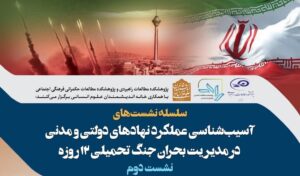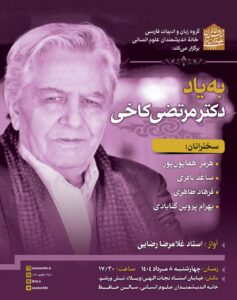
According to the news agency Online news, Abbas Abdi By writing a note in today’s newspaper trustwith the title “against the law; What is the law?” He made a thoughtful and sociological critique of the Parliament’s decision on hijab. Check out this note below:
***
* The simplest definition of the law is; “A rule that is approved and implemented by a competent authority, which is usually the legislature.” Well, now let’s assume that such authority approves for various reasons that people should be silent for one minute every day and at a certain time. You will probably say that the author has lost his mind, can such a law be passed? The impossible assumption is not impossible. In addition, it is not impossible. The law passed by the parliament under the chairmanship of Mr. Qalibaf with the ambitious but irrelevant title “Supporting the family by promoting the culture of chastity and hijab” has many strange statements in 74 long articles.
* The insistence of extremists to implement and announce this resolution and in these public conditions, more than a reflection of moral and Islamic obligations, it indicates an important political story behind it, because it has been a long time since the text of the resolution was finalized with non-public exchanges. and now, with great delay, Mr. Qalibaf said the following about his law: “Hijab has a law and this law will be promulgated in its own time. It is a bill and the government added some articles to it, we In the parliament, we said that some dimensions should be added and it cannot be viewed only negatively. According to the hijab law that I will promulgate on December 23, the person who removes the hijab, in the second stage, the penalty for committing the hijab for the first time will also be added to it. We tried to prevent any direct conflict.”
Now let’s pose the initial question in another way. What is justice? If we consider the goal of the law to be justice, then it should be said that justice is the implementation of the law. So, if the law is not established and approved on the basis of justice, it is not a law, but an injustice done in the name of the law. Like many laws that were passed and implemented in previous regimes. So, the main goal is justice, from this point of view, the philosophy of law and law should be directed towards justice and social order. Of course, a fair order.
The law has two aspects. First; The law is in terms of its form and internal politeness, and the other is the content of the law. In terms of form, the law must have several important features. I will mention the important things that are not included in the current resolution of Mr. Qalibaf’s hijab. The law must be public. Of course, it will be made public after it is announced, but why was it approved in secret in the 85th Commission at the time of its approval, and even after a long time has passed since the beginning of the government’s presentation of the bill, there is not much about this resolution on the website of the Majlis Research Center.
* In addition, although Mr. Qalibaf asked himself and the parliament to remove responsibility, and considered it a bill of the government and the judiciary, but it really cannot be considered a bill because so many changes have been made in it that it reached 29 pages, while Originally, it was a small bill, and the final text cannot be considered as the initial bill anymore, because it has completely changed its nature.
*Most importantly, this text was reviewed and approved by the Article 85 Commission, which is a small number of people, while there was no need for it. The clear reason is the fear of informing the people about its contents before the final approval. In addition, the fear of the representatives in defending the details is that they will be hated by the people. Therefore, the condition of being public for the law does not include this resolution.
* The second condition is the ability to implement or stability over time. How can a law, which from the very beginning, most of the legal, political, administrative and governmental experts believe that it is not enforceable, and the president also believes that the government is not able to implement such a resolution, and without a doubt, the officials of most of the institutions related to the resolution also have the same opinion, how can stable and workable?
* The next condition is not to impose impossible requirements on individuals by the law. A law that cannot be implemented except by informing the people and even using foreign nationals against their own people is against the law in the true sense. In this law, people should be turned into informers to inform against themselves. Which government, even the communist one, trained informants to such an extent that some people want to do? What was the result of those investigations? Suppose someone commits suicide on the street, people immediately inform, or even rush to support the victim, they don’t need a legal requirement. If they hear a suspicious sound from the neighbor’s house, they immediately inform the police. Does anyone oblige them to inform? no Because they know that there may be a real crime, not the behavior that is being done by women every day in the street.
* The next condition is the clarity of the provisions of the law. This law lacks it, in fact it is not a law. It has not been able to give a comprehensive definition and a serious obstacle to what is introduced as a crime. It is a legislative axiom that concepts and behaviors are first defined legally and objectively. For example, when it comes to illicit relationship, it is defined precisely and clearly, while this law does not have a definition. Note 2 of Article 1 defines immorality as any kind of sexual behavior, speech, and movement against Sharia.
* It is really absurd that the legislator defines a word and behavior so loosely and vaguely and wants to consider it a crime. Maybe the legislators are sexually aroused by the slightest behavior and speech, what does that have to do with the people? Besides, what does it mean against Sharia? There are so many fatwas and everyone imitates their authority. Legislators should include examples of violations of Sharia in the law. In addition, many are not Muslims, what does it mean for them to be against Sharia?
*Or they have written about the discovery of hijab by those who do not wear a veil, a mask, a scarf, or a shawl. This is a new definition and it is a deviation from the sharia hijab, in other words, the problem of the approvers is not the sharia hijab, it is just a shawl on the head. So, if it is not, you should use traditional coverage as a criterion. For example, if someone wears a half scarf on his head and has makeup and the main part of his hair is visible, is it okay? You who have come this far, are you just waiting to throw an irrelevant shawl on your head!!?
* The next condition is the necessity of coherence between the rules and the implementation of the law with its content. It is clear that this feature is not in the aforementioned resolution. The current note on hijab, which they have tried to be precise, includes the sharia hijab, which is as follows in the note to article 638: ▪️ “Women who appear without a sharia hijab in the streets and in public will be imprisoned from ten days to two months, or from 6,600 000 to 33,000,000 Rials will be fined.”
* This crime is considered the 8th degree, which means it is the last and least important crime in Iran’s criminal system, and it does not even need a prosecutor’s office, and it is brought up and dealt with directly in court. Now this article is canceled, and hijab is not necessary in the Shari’a sense, but they have developed such a crime that committing it a second time is even more severe than crimes of degrees 4 or 5. This shows that the approvers are not familiar with any of the basics of law writing. They have brought the work to a place where they have used the cameras of the security institutions to control and restrain women’s clothing!!
*Basically, crime refers to acts committed by a small number of people. This resolution will consider millions of women and even men as examples of criminal behavior and thousands of new cases should be opened daily. That is not a crime. Such a resolution delivers a majority of criminals, but it does not solve the problem. why
*You stopped some women with the desired coverage in public places, what will you do in private places? It is there that the psychological knots created in the public space are opened. The mistake of the approvers is that they do not pay attention to the results of studies and surveys, they are not even willing to look around themselves. You can’t deal with a community? The religious aspect of hijab is ten times more important than its behavioral aspect and this law will not only fail to change behavior but will weaken the religious aspect of hijab and make it disgusting.
* The main and important weakness of this resolution is its philosophy. This law does not follow the Sharia philosophy, nor the philosophy of natural rights, nor the social philosophy of law, it is a superficial and non-rational form of positivist philosophy that considers the law to be the ruling will. First, this resolution is not equivalent to the ruler’s will. The overwhelming majority of the executives for which it is intended do not agree with the implementation of such a harmful resolution. But most importantly, this law not only does not lead to results, but has the opposite result. Because it weakens the credibility of hijab and religious covering in the eyes of the public. This resolution is based on the philosophy of force and prohibition and punishment. This philosophy has never been able to succeed, as it has not been able to solve the problem so far. In the short term, it may have some effects, but in the medium term, its results are completely opposite.
* It is enough to refer to the significant reduction of the hijab in the last two years, when violent clashes took place. According to the jurisprudence rule of “sanctity of repugnance”, it is forbidden to do any act that causes people to dislike and hate religion. In this way, the results of this law can be easily measured and researched. Unfortunately, they want to set fire to Caesarea, Iran, for a handkerchief of power.
* The important problem of this resolution is the misunderstanding of the function of education. They think that people don’t wear hijab because they don’t know how harmful it is. While they don’t pay attention, for about 45 years, they have been promoting and teaching about hijab, and it has the opposite result.
*Incidentally, people without hijab are those who have relatively higher educational and scientific levels and not only do not lack education, but they have been under education and propaganda in these 45 years, and they have seen all these educations; These very diverse programs for education and promotion, etc., which are mentioned in the resolution, are a kind of shop for the business of some people, the result of which is the waste of people’s material resources and negative effects on hijab.
* Acceptable philosophy of law can only be social philosophy. Through the acceptance of society, religion can be reflected in legislation and rights. Limiting the law to religion and sharia has no other result than weakening religion, as the experience of the past half century proves.
A law that is not accepted by the people will challenge the entire government and its authority. In fact, it questions the law and the legitimacy of the institution that emerged from it. Law is for the growth and preservation of social life and not the dominant power. A law that is against the people is not fair. It is like water that is polluted and causes disease, even though its name is water. A law whose content is flexible and undefined is more than anything to humiliate and destroy people or not to implement it.
*We suggest that you ask the judges to see how many of the judges who have to rule agree with it. Judges are the closest forces to government values. Perhaps an important part of them will find the implementation of this law contrary to their empirical justice. A decisive majority of non-judicial executives will not agree with it either. This claim can be easily tested.
*Surely, the parliament thinks that everyone should implement its resolution!! This perception is completely lacking in validity and rationality. You are a very small minority, you cannot assign duties to the majority of the nation, you can only represent the wishes and demands of the majority.
* This resolution is also unfair and discriminatory in some cases. For example, observing the hijab is considered important in admission and top student scores, while what does science have to do with the hijab? The gentlemen themselves choose the best foreign hospitals for treatment if they can, none of which have veiled doctors, but when it comes to the people, the veil should be considered as a student’s privilege and promotion.
216216
منبع: www.khabaronline.ir








